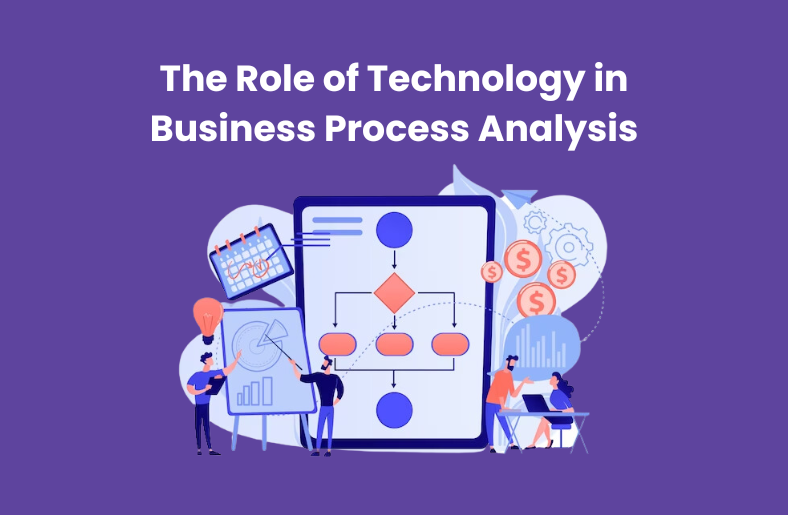To remain ahead in the corporate world, one must embrace change and take advantage of the
accompanying technological improvements. Two terms that jump out at us as we negotiate the
complex web of commerce are “Business Analysis Courses” and “Business Process Analysis.”
These are not just catchphrases; rather, they are pillars that support organizational success. In
this blog, we explore technology’s critical role in business process analysis, showing how it
molds and polishes the fundamentals of how businesses operate.
Table of Contents
Technology Revolutionizing Business Process Analysis
The Impact of Technology on Business
Integrating Technology into Business Operations
Data-Driven Decision Making
Technology’s Role in Business Evolution
Using Technology for Competitive Edge
Challenges and Opportunities
Technology’s Role in Responsible Business
Conclusion
Technology Revolutionizing Business Process Analysis
An unrelenting rate of change characterizes modern business. Modern technological
advancements are now what propel the practical examination of corporate operations.
Professionals are being guided through this ever-changing environment by business analysis
courses. Knowing how technology is changing the field of business process analysis is crucial as
we set out on this adventure.
The Impact of Technology on Business
Technology is the driving force in business process analysis, easing the complexity that often
envelops operational processes. Businesses today have an unparalleled arsenal at their
disposal, ranging from artificial intelligence-driven algorithms to sophisticated data analytics.
These technologies, which are often thoroughly discussed in modern business analysis courses,
enable analysts to identify future trends and bottlenecks and analyze current processes.
Integrating Technology into Business Operations
Synergy is crucial in business process analysis. Technology is the glue that unites dissimilar
procedures into a unified and efficient whole. Business analysts may better understand how to
match technology interventions with overall company goals by looking through the lens of
business analysis courses. This strategic alignment promotes productivity and creativity by
ensuring that technology becomes an enabler rather than a simple addition.
Data-Driven Decision Making
Without addressing the importance of data, no debate on the role of technology in business
process analysis is complete. The widespread use of big data analytics techniques and
technologies has completely changed how companies make decisions. Organisations may now
use real-time data to verify and enrich their research, as is emphasised in many business
analysis courses. This fosters an educated decision-making culture that is flexible and sensitive
to market changes.
Technology’s Role in Business Evolution
There is no denying the connection between innovation and technology. Within the framework
of business process analysis, technology acts as a driving force for ongoing improvement.
Professionals who have completed business analysis courses are equipped to recognise
inefficiencies and redundancies, which opens the door for creative solutions. Firms may change
and adapt to a constantly changing environment through automation, AI, or machine learning.
Using Technology for Competitive Edge
In the corporate world, those with the finest technology are often the ones who gain a
competitive edge in the market. Professionals see technology as a continuous commitment to
keeping ahead of the curve rather than a one-time expense when seen through the lens of
business analysis courses. Technology-driven business process analysis offers the flexibility to
adjust to changing consumer needs, new trends, and market changes.
Challenges and Opportunities
Although technology has many advantages in business process analysis, there are also many
difficulties. Businesses face challenges from cybersecurity risks, data privacy issues, and the
quickening speed of technology obsolescence. However, these difficulties also provide chances
for development and resiliency. In the digital age, companies that can successfully manage the
risks associated with technology while using its potential will prosper.
Technology’s Role in Responsible Business
As companies use technology to improve business process analysis, a new frontier that
necessitates carefully weighing the ethical ramifications arises. The significance of using
technology responsibly is increasingly emphasized in business analysis courses. Innovation in
business process analysis benefits the organization and society when balanced with ethical
concerns.
Conclusion
Technology and business process analysis work together in a way that is more than simply
convenient; it is a marriage that will drive enterprises into the future with unmatched creativity
and efficiency. Professionals who arm themselves with information from business analysis
courses become change architects, transforming business procedures and guiding organizations
toward success in a world driven by digital technology. Analysis is just the beginning of the trip;
as technology advances and opens up new perspectives and opportunities for those who are
prepared to embrace the future, the journey never ends.
